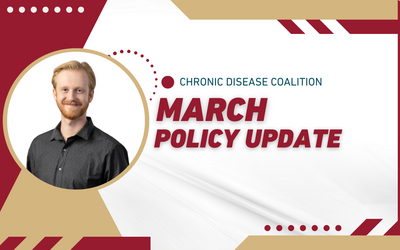
By Nathaniel Brown, director of advocacy
It’s National Kidney Month — have you celebrated yet? If you haven’t (or even if you have!) take 30 seconds to send a quick email to your federal elected officials and tell them to support the Living Donor Protection Act. This important law would provide job, insurance and other protections to people who donate their kidneys to others. An act of generosity so profound should be celebrated, not punished. Let your leaders know where you stand.
As we dive into April, we wanted to take a moment to quickly recap the recent activities and initiatives going on within our coalition. Legislative sessions that picked up steam in February and March are beginning to plateau. However, there are critical bills in many states that the CDC is working on passing — and some states, like California, are just getting started.
If you’re interested in learning more about any of these issues, reach out to our Director of Advocacy Nathaniel Brown: nathaniel@chronicdiseasecoalition.org.
As of this writing on March 27, legislation to expand Medigap is still moving through legislatures in Ohio, California, and Iowa. Reforms to step therapy and prior authorization protocols in Rhode Island, Arizona, Wisconsin, New Jersey, and Colorado continue to be debated.
We’re also beginning to work on a bill in North Carolina that would streamline the advanced care directives process. One of the CDC’s longtime ambassadors, Claire Sachs, testified this month in support of a pharmacy benefit management reform bill in her home state of Maryland (after 8 hours in the capitol building!).
Oregon successfully passed a copay accumulator ban and PBM transparency legislation, while Florida made strides with a bill concerning organ transportation. Other states still considering copay accumulator bans are Missouri, Ohio, California, and a few others.
Finally, the CDC submitted comments to the Prescription Drug Affordability Boards in Oregon and Maryland (see page 3) as they embark on conversations about the best way to control the cost of treatment for various health care consumers. From our perspective, we need more progress on direct benefits to the communities these boards are charged with serving — the patients.
These issues are all on our policy map, and we're working in tandem with many other patient advocacy organizations that are on the ground in state capitols around the nation. If you or your organization needs assistance on any particular issue, let us know!